In the digital age, the abundance of information on the internet has fueled the demand for efficient data extraction methods. Web scraping has emergedas a cornerstone technique, enabling individuals and businesses to collect valuable data for purposes ranging from market research to competitive analysis. While the manual process can be labor-intensive and intricate, the advent of web scraping API tools has ushered in automation, revolutionizing the data extraction landscape.
What are Web Scraping API Tools?
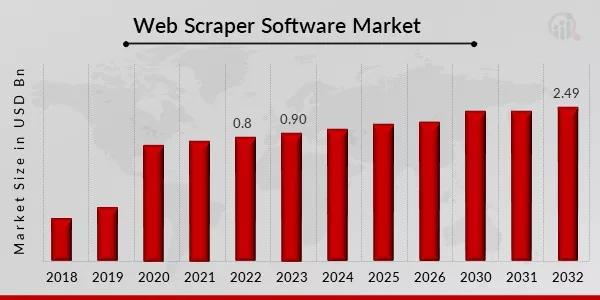
Web scraping involves the automated extraction of data from websites, often performed using scripts or programs. This technique delves into the parsing of HTML and other web page formats to pinpoint and retrieve specific data points. Despite being a powerful method for swiftly amassing substantial data, web scraping can be intricate and time-consuming. This complexity has spurred the popularity of web scraping API tools, offering users a streamlined and automated approach to data extraction.
A web scraping API tool operates as a service that grants users access to website data through an application programming interface (API). Through these tools, the cumbersome task of data extraction is automated, enabling the swift and efficient scraping of large datasets.
Learn about competitive intelligence and web scraping here.
Benefits of Web Scraping API:
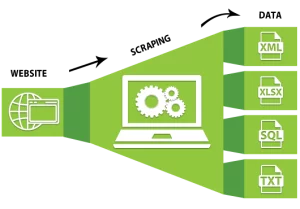
- Automated Data Extraction: Web scraping APIs automate the process of extracting data from websites, eliminating the need for manual copying and pasting. This significantly speeds up data collection and ensures accuracy.
- Structured Data Output: Web scraping APIs provide structured and organized data output, typically in JSON or XML formats. This makes it easy to integrate the extracted data into databases, analytics tools, or other applications.
- Real-time Data Access: APIs allow real-time access to up-to-date information on websites. This is particularly useful for applications requiring the latest data, such as stock prices, news updates, or social media trends.
- Scalability: Web scraping APIs are scalable, enabling users to extract data from multiple pages or websites simultaneously. This is advantageous for large-scale data extraction projects where efficiency and speed are crucial.
- IP Rotation and Proxy Support: Many web scraping APIs offer IP rotation and proxy support, helping users avoid IP bans or restrictions imposed by websites. This ensures continuous and uninterrupted data extraction without the risk of being blocked.
- Data Enrichment: Web scraping APIs often include features for data enrichment, allowing users to retrieve additional information related to the extracted data. This can include details like geolocation, social media profiles, or other relevant metadata.
- Compliance with Terms of Service: Reputable web scraping APIs are designed to comply with websites’ terms of service. They often include features to adjust scraping speed, limit the frequency of requests, and respect robots.txt files, ensuring ethical and legal data extraction.
- Cost and Resource Efficiency: Web scraping APIs save resources and costs by automating the data extraction process. They require less manual intervention, reducing the time and effort required for data collection compared to traditional scraping methods.
- Customizable Queries: APIs usually allow users to customize queries and parameters, enabling them to specify the exact data they need. This flexibility ensures that users can tailor their requests to meet specific requirements.
- Reliability and Maintenance: Web scraping APIs are maintained by the providers, ensuring that the extraction process remains reliable even as websites undergo changes. Providers often update their APIs to adapt to website updates or structural modifications.
Top Web Scraper API Tools:
1. Oxylabs Scraper API: Unleashing Effortless Data Collection
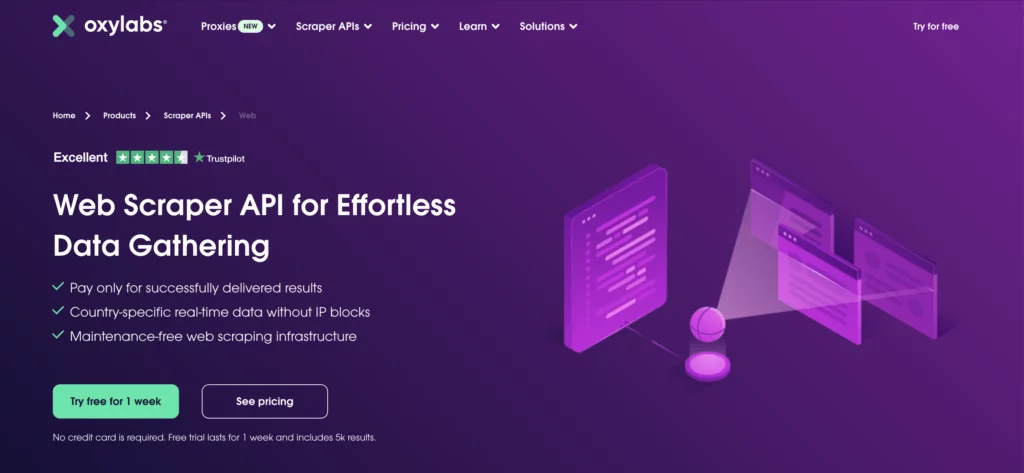
Oxylabs stands out as an excellent solution for individuals and businesses seeking seamless access to public data and premium proxies. With features designed to simplify the web scraping process, Oxylabs offers ready-to-use code samples and supports multiple programming languages. Boasting a proxy pool of over 102 million residential proxies, an AI-powered web unblocker, proxy manager, mobile proxies, and more, Oxylabs caters to diverse scraping needs.
Pros:
- Pay-per-Success Model: Users pay only for successful results, ensuring cost-effectiveness.
- Localized Content Access: Facilitates easy access to content localized to specific regions.
- Extensive Proxy Pool: With a pool exceeding 102 million proxies, users have ample resources for data collection.
- Cloud Storage Integration: Enables seamless data delivery to cloud storage buckets like AWS S3 or GCS.
- 24/7 Support: Oxylabs provides round-the-clock support via live chat and email.
- Free Trial: Users can explore the platform with a one-week free trial.
Cons:
- Setup Complexity: Setting up Oxylabs may pose challenges for users unfamiliar with the platform.
2. Bright Data: Elevating Web Scraping to New Heights

Formerly known as Luminati, Bright Data emerges as a comprehensive web scraping and data collection platform equipped with an array of tools. From residential proxies to data unblocking and advanced scraping algorithms, Bright Data prioritizes data quality and accuracy.
Pros:
- Tool Variety: Bright Data offers a wide range of tools and features to cater to diverse scraping requirements.
- Data Quality: Ensures a high level of data quality and accuracy.
- Customer Support: Bright Data provides excellent customer support to assist users.
Cons:
- Complex Setup: The platform may pose complexities during the setup and usage phases.
3. Apify: Empowering Web Scraping and Automation
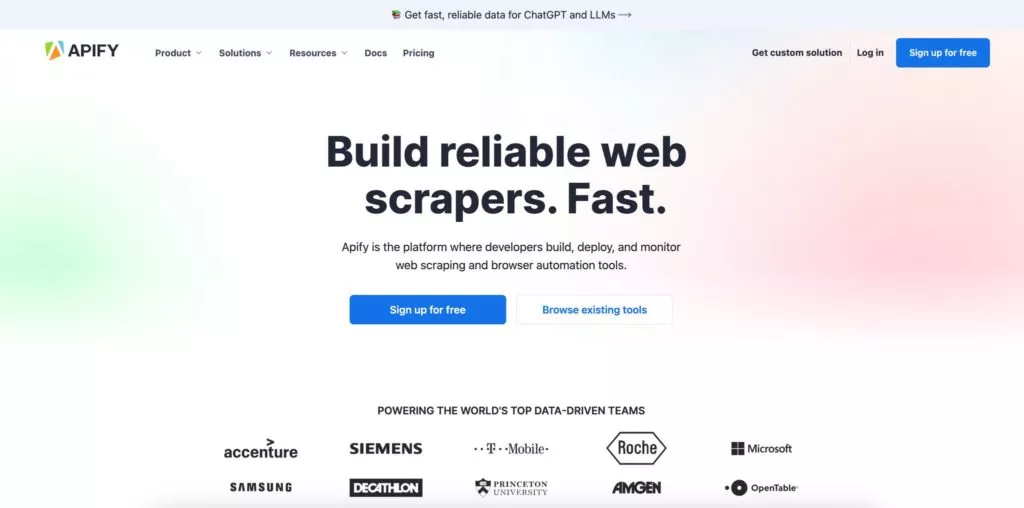
Apify takes center stage as a versatile web scraping and automation platform, empowering users to extract data, automate workflows, and build custom APIs. With an intuitive user interface and a suite of tools, including pre-built and custom scrapers, Apify accommodates users ranging from beginners to experienced developers.
Pros:
- User-Friendly: Even beginners find Apify easy to use.
- Pre-built Scrapers: Offers pre-built scrapers for popular websites, saving time and effort.
- Custom Scraper Creation: Allows users to create custom scrapers tailored to specific needs.
- Comprehensive Feature Set: Provides a wide range of tools and features for diverse applications.
Cons:
- Cost for Larger Datasets: Can become expensive for users dealing with larger datasets.
- Customer Support Concerns: Some users have reported issues with Apify’s customer support.
Pricing: Apify offers both free and paid plans, with prices starting at $49/month.
4. ScrapingBee: Powering Reliable and Scalable Web Scraping
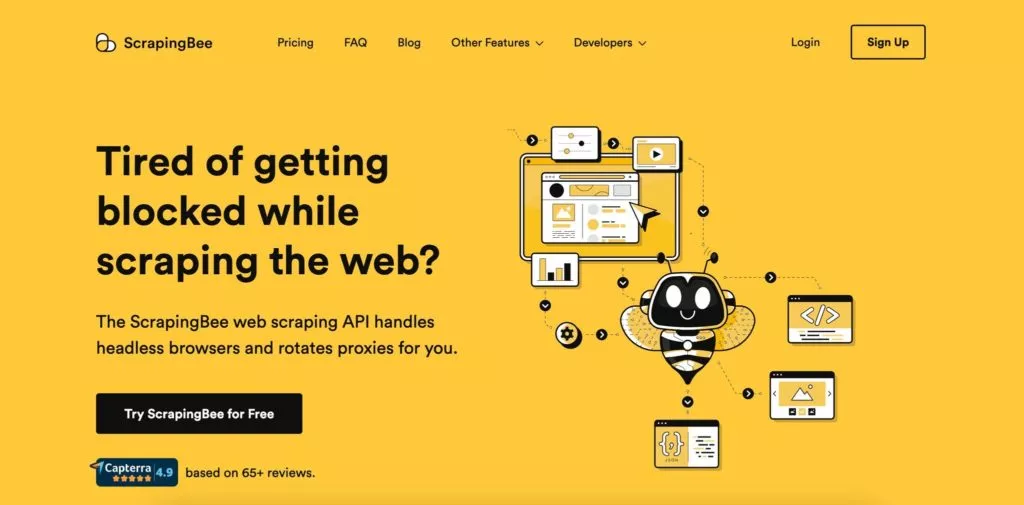
ScrapingBee emerges as a robust web scraping API tool, offering a dependable and scalable solution for data extraction from websites. Its feature-rich offerings include rotating proxies, JavaScript rendering, and customizable headers.
Pros:
- Advanced Features: ScrapingBee provides a suite of advanced features, enhancing the versatility of the tool.
- Reliable and Scalable: The platform ensures reliable and scalable scraping solutions, catering to varying user needs.
- Diverse Pricing Plans: Offers a range of pricing plans to accommodate different requirements.
Cons:
- Higher Cost: Comparatively, ScrapingBee may be more expensive than some other tools in the market.
- Documentation Issues: Some users have reported challenges with the API documentation.
Pricing: ScrapingBee provides both pay-as-you-go and subscription plans, with pricing starting at $29/month.
5. ParseHub: Simplifying Data Extraction with Point-and-Click Ease
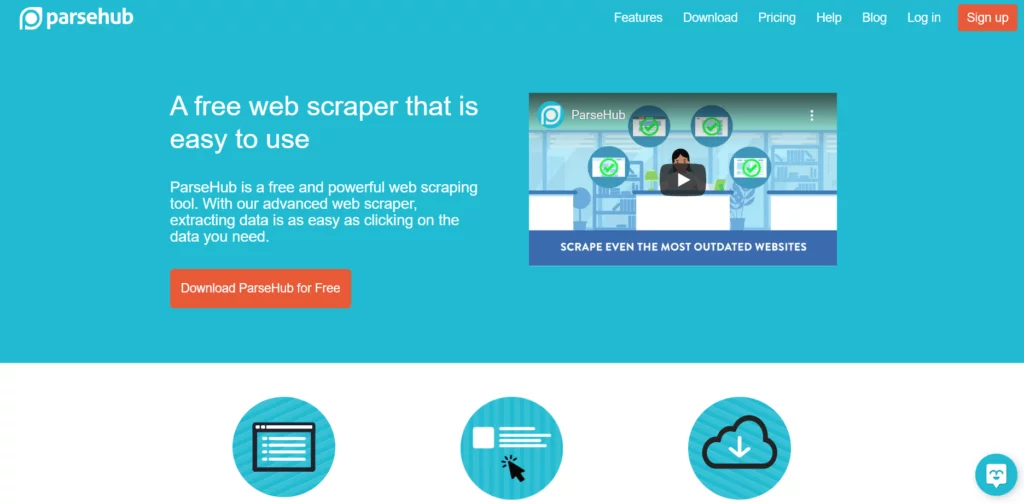
ParseHub stands out as a user-friendly web scraping tool, allowing users to extract data using a straightforward point-and-click interface. Offering features like custom templates, JavaScript rendering, and data export, ParseHub caters to users with varying technical expertise.
Pros:
- User-Friendly: ParseHub is easy to use, making it accessible even for those without technical expertise.
- Point-and-Click Interface: Provides a point-and-click interface for effortless data extraction.
- Customization Features: Offers a range of features for customizing scrapers according to user preferences.
Cons:
- Limited Flexibility: Some users find ParseHub less flexible compared to other tools.
- Data Export Issues: Users have reported challenges with the data export process.
Pricing: ParseHub offers both free and paid plans, with prices starting at $149/month.
6. ScraperAPI: Reliability Meets Scalability in Web Scraping
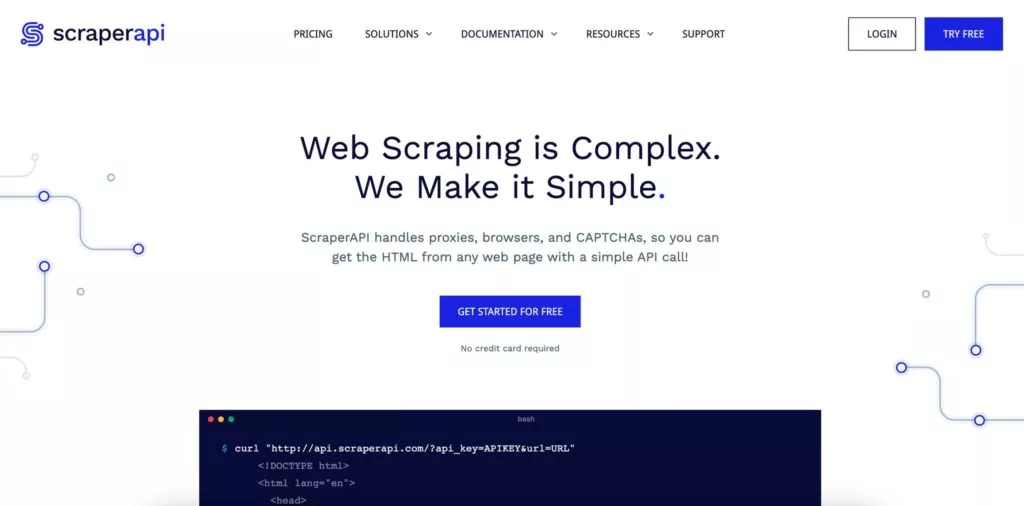
ScraperAPI positions itself as a reliable and scalable web scraping API tool, equipped with features like rotating proxies, JavaScript rendering, and CAPTCHA solving. Offering a free plan for testing and development, ScraperAPI caters to users seeking a balance between functionality and affordability.
Pros:
- Advanced Features: ScraperAPI provides a diverse set of advanced features for comprehensive scraping solutions.
- Reliability and Scalability: Ensures reliable and scalable web scraping capabilities.
- Free Plan: Offers a free plan for users to test and develop their scraping projects.
Cons:
- Higher Cost for Larger Datasets: For larger datasets, ScraperAPI may be comparatively more expensive.
- Documentation Challenges: Some users have reported difficulties with the API documentation.
Pricing: ScraperAPI offers both pay-as-you-go and subscription plans, with prices starting at $29/month.
7. Scrapingdog: Simplifying Web Scraping with Specialized APIs
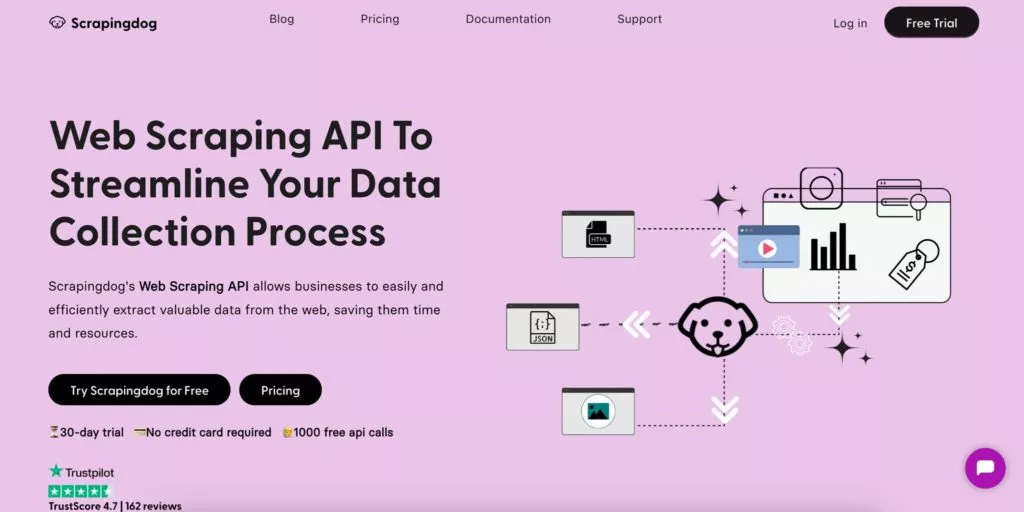
Scrapingdog provides a user-friendly Web Scraping API tailored for data extraction from various sources. Offering specialized APIs for scraping specific websites like LinkedIn, Amazon, Zillow, X (formerly Twitter), and Indeed, the platform includes rotating proxies, JavaScript rendering, and CAPTCHA resolution.
Pros:
- Diverse Pricing Plans: Scrapingdog offers a variety of pricing plans to meet different user needs.
- Clear Documentation: The platform’s documentation is easy to understand, facilitating smoother user experiences.
- Excellent Response Rate: Scrapingdog boasts an excellent response rate and stability.
- Customer Service: Users commend Scrapingdog for its excellent customer service.
Cons:
- Technical Knowledge Required: It may be more suitable for users with some technical knowledge.
- Limited Data Export Formats: The API does not support data extraction in .csv or Excel format, requiring additional libraries.
Criteria for Selecting Web Scraping API Tools:
- Ease of Use: The tool should boast user-friendly interfaces, catering to individuals with varying levels of technical expertise. Intuitive navigation and straightforward functionalities enhance accessibility.
- Quality and Quantity of Data: Accurate and efficient data extraction is paramount. The selected tool should exhibit prowess in precisely extracting the desired information from diverse websites, ensuring both quality and quantity.
- Scalability: Scalability is a crucial factor, particularly for those dealing with extensive datasets. A reliable web scraping API tool should seamlessly handle large volumes of data without compromising on speed or stability.
- Pricing: Cost-effectiveness is a key consideration. The chosen tool should align with budgetary constraints while providing commendable value for the investment made.
- Security and Reliability: The tool’s security features and reliability are non-negotiable. Minimal downtime, robust security protocols, and a track record of technical stability are imperative for a trustworthy web scraping experience.
Conclusion:
In conclusion, web scraping API tools offer a streamlined and effective approach to data extraction from websites, and the top contenders in 2024 include Apify, ScrapingBee, BrightData, ParseHub, and ScraperAPI. These tools empower users to effortlessly collect data through automated scripts. When selecting the most suitable tool for your requirements, consider crucial factors such as ease of use, data quality and quantity, scalability, pricing, and security and reliability. With the right web scraping API tool, you can swiftly and efficiently amass valuable data. We trust that this exploration of the best web scraping APIs has been informative and beneficial to you!
FAQs Related to Web Scraping API:
- What are The Benefits of Using A Web Scraping API Tool? Using a web scraping API tool can save time and resources, automating the data extraction process, enabling precise and accurate data collection, and efficiently handling large data sets.
- What Should I Look for in A Web Scraping API Tool? Factors such as ease of use, data quality and quantity, scalability, pricing, and security and reliability should be considered when choosing a web scraping API tool.
- Are Web Scraping API Tools Legal? Web scraping itself is not illegal, but users must adhere to the terms of service and copyright laws of the websites they are scraping. Legal considerations vary, and compliance is essential.
- Can Web Scraping API Tools Be Used For Any Website? Not all websites permit web scraping, and legal restrictions may apply. It is crucial to review the terms of service and copyright laws of the target websites before employing a web scraping API tool.
- What are Some of The Top Web Scraping API Tools in 2024? Apify, ScrapingBee, BrightData, ParseHub, and ScraperAPI are among the top web scraping API tools in 2024. Each tool offers unique features and pricing structures, requiring careful evaluation based on specific needs.



